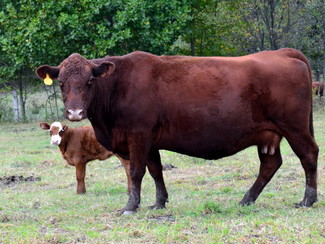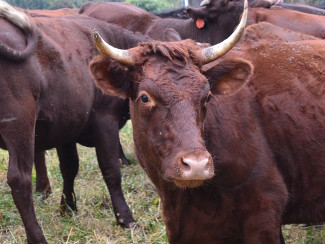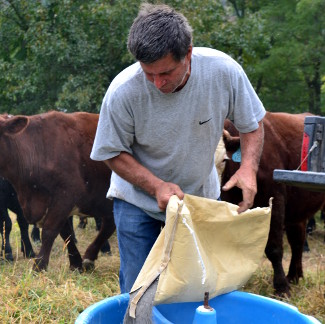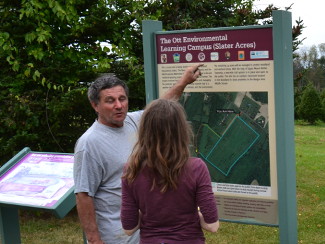
Local Spotlight: Harvest Home 100% Grass-Fed Beef
Rich DiFebo's farm is a sprawling piece of pastureland located near Bangor, Pennsylvania. The day we visited the farm butterflies flitted onto the tiny flowers that dotted the landscape and chicken hawks soared overhead. Rich raises primarily Red Devon and Black Angus cattle which he sells either through his website, or through various natural food retailers in the Pocono and Lehigh Valley areas, such as Earthlight Natural Foods. His cattle are hormone and antibiotic free and are fed on the farm's own pesticide-free grasses the entire year.

His Black Angus and Red Devon cows were chosen for their superior genetics and short stature. The cattle's shorter stature is significant when raising grass-fed cattle since that makes them optimal beasts to feed on the various grasses found throughout the farm. The grasses that he has them feed off of are deliberately cultivated by gently rotating the cows throughout the fields as each season progresses. Each grass has a slightly different nutrient profile, something Rich will talk about in great detail if you let him.
Rich's current position as sustainable farmer may come as a surprise to those who know about his forty-year career stint in the lawn maintenance business. This and his current profession couldn't be more unlikely bed fellows when you consider the differences between them. In his role as farmer, his job first and foremost is to preserve the diversity of his local environment. His grasses all must be in the correct balance to nourish his cattle properly.

Conversely, to be a lawn care specialist means you must destroy any plants that get in your lawn's way until only the grass is left. This creates a monoculture. Since he has such a deep desire to raise sustainable grass fed cattle, we know what drives him (other than the desire to cultivate some damn good meat): a love of the land and a commitment to sustainability.
Just as interesting as his meat, is an educational outreach project he has recently completed in conjunction with the the Bangor Area School District. What they have created together is a self-contained educational site that creates winter pastureland for Rich's cattle, and also a place to enrich area students. The site is located in such a way that it is protected from the cold west wind, a wind that makes winters in the area intolerable to his cattle. It also is an opportunity to show the community the importance of sustainably developed food.
When he heard the school's original plan was to lease the site to corn and soybean farmers, Rich suggested to a school official that perhaps it would be more sustainable to allow it to be used as test plots for biofuels instead. He realized school officials were listening when he received a call from the school's superintendent soon after and was requested to perhaps use the land to graze his cattle on instead. After that he was officially tied to the project, and has continued working on it for the last twelve years, securing funding from various sources including the USDA.

Rich's example shows how farming gives you ample opportunity to be a good steward of the land AND the community. According to Rich, by using the small piece of land the school district has provided for him to maintain grassland rather than using it to grow corn and soy, he has managed to reduce carbon emissions by ninety two tons. This is a whopping amount of greenhouse gasses for the small bit of area involved.
Not only is his work on his cattle farm environmentally sustainable to the highest degree, but his environmental outreach educates the youngest members of the community on sustainability and why the type of food they eat is important. So as Rich is piloting his own land to a better place and creating a better home for his cattle, he is embracing opportunities to teach others too.
My lasting impression of the farm was the sheer amount of blood, sweat, and tears needed to make it all happen. Once you learn that Rich's five hundred acres produce just fifty store-ready cattle per year, you appreciate the magnitude of what it takes to put sustainable meat on our tables. Thanks to his project with the Bangor Area School District, the remaining community will soon see its significance too.